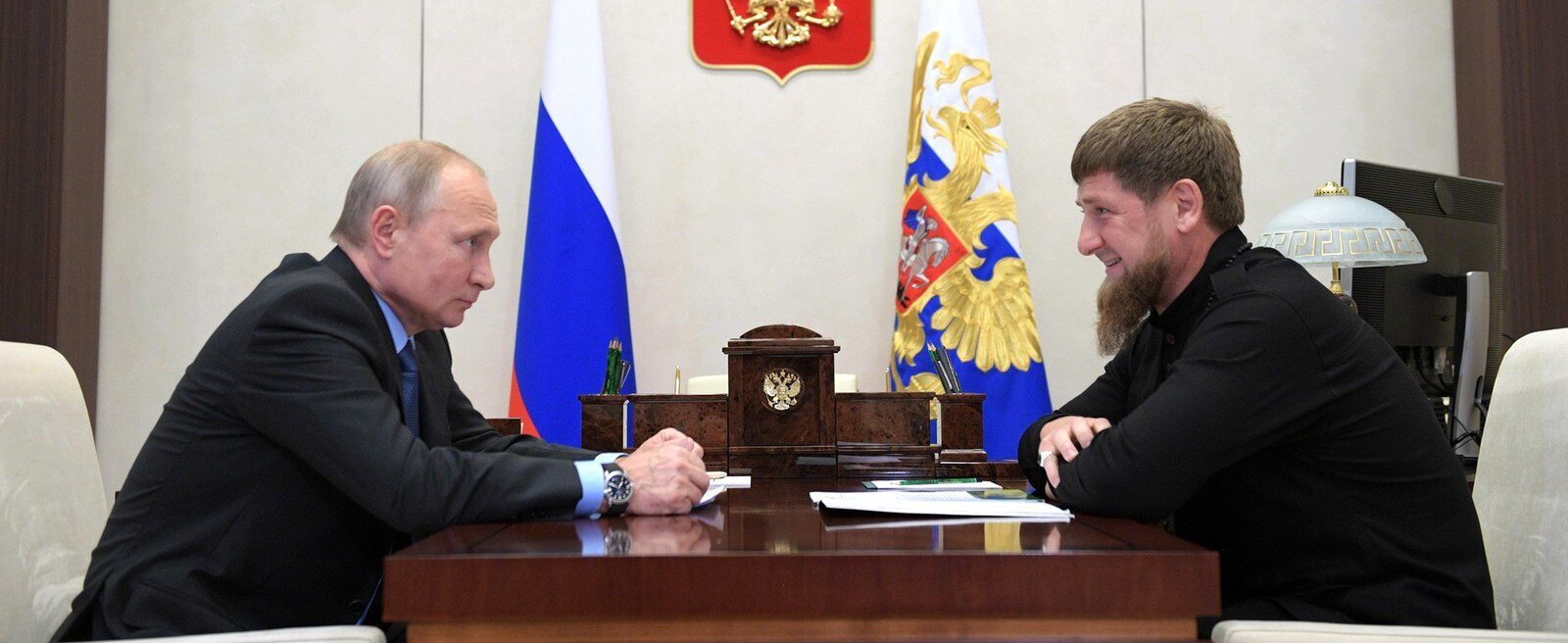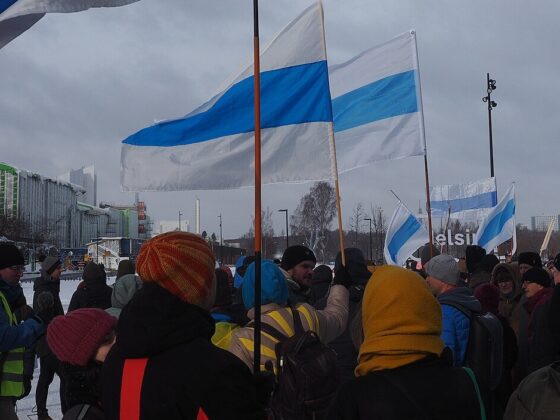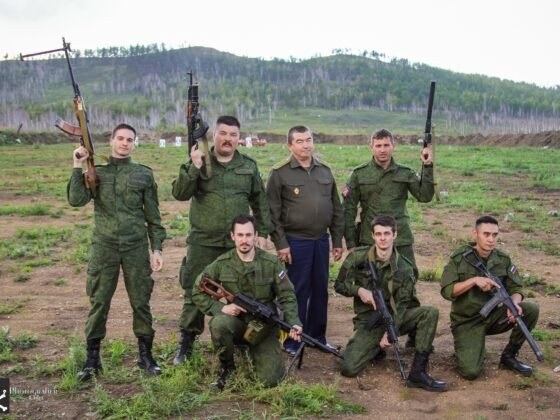In this policy memo, we analyze the ways in which Ramzan Kadyrov has instrumentalized Russia’s successes and failures in the war in Ukraine for his own political benefit. We center our analysis on his Telegram channel, “Kadyrov_95,” examining all posts between the onset of the full-scale Russian invasion in Ukraine (February 24, 2022) and October 16, 2023—a total of 2,098 posts. In our analysis, we distinguish four periods between which Kadyrov’s discourse changed in response to major political and military events. Over time, his initial embrace of Moscow’s narrative around the Russian invasion of Ukraine has evolved, leading first to an opposition to mobilization, then to criticism of the Russian General Staff, and most recently—following Prigozhin’s abortive coup in Summer 2023—to self-promotion efforts to ensure his own survival and rally Chechens behind his regime. Although Kadyrov has to date remained staunchly loyal to Putin himself, the significant changes that his discourse has already undergone hint at the possibility that his loyalty to the Kremlin may change.
Boasting of Success (February–May 2022)
Following the beginning of the full-scale Russian invasion of Ukraine, Kadyrov’s Telegram channel gradually took over as the main propaganda mouthpiece of the regime in Chechnya. Created in 2017, his channel had around 50,000 subscribers at the beginning, but following the closure of his Instagram account and the beginning of full-scale war in Ukraine, his number of followers skyrocketed, reaching more than two million people by October 16, 2023. Thus, Kadyrov’s Telegram has become the main mouthpiece of the regime.
Using Natural Language Processing software, we calculated that in the period from February 2022 to October 2023, as much as 95% of the content on the “Kadyrov_95” channel was dedicated to the war in Ukraine. By and large, Kadyrov’s propaganda efforts were aligned with Russia’s overarching narrative, which likewise justified the war by employing labels such as “Nazis” and “Banderovites” to describe Ukrainians. Within the overarching theme of the war, various subtopics emerged, including the success of Kadyrov’s troops, his efforts to discourage Ukrainians from fighting, and propaganda attempts to downplay Ukraine’s achievements. Notably, the evolution of Kadyrov’s rhetoric regarding Russian military strategies in Ukraine and in response to the internal political dynamics among Russian elites underscores how he has strategically adapted to developments in the war to serve his own political interests.
Immediately following the Russian invasion, Kadyrov’s Telegram was conspicuously silent for a few days. The first information about the war appeared on February 26, 2022, with a video that depicted the Kadyrovtsy, the unofficial military force under Chechnya’s leadership. The footage showed a well-equipped and sizable military assembly, meant to demonstrate the readiness of Kadyrov’s troops to be deployed to the Ukrainian front line. The accompanying text post claimed that this force comprised 12,000 soldiers, whom Kadyrov had personally addressed.
In his discourse during this period, Kadyrov drew parallels between the situations in Syria and Ukraine, accusing the West of instigating the war. He emphasized Vladimir Putin’s pivotal role in safeguarding Russia, as well as the self-proclaimed people’s republics of Donetsk and Luhansk and their inhabitants. When describing Ukraine’s military and political elite, meanwhile, Kadyrov used derogatory terms like “Nazis,” “terrorists,” and “Satans” (the latter was usually reserved for Chechen volunteers fighting on the Ukrainian side). He expressed his ambition to liberate the people of Donbas and even indicated a readiness to “take over” and “govern” Europe—an assertion met with chants of “Akhmat Sila” and “Allahu Akbar.”[1] As is customary in his speeches, Kadyrov professed a willingness to carry out “any order of the Supreme Commander-in-Chief,” a reference to Vladimir Putin.
Throughout this first period, Kadyrov’s posts and speeches aligned closely with Russia’s early-stage war propaganda. He maintained an overly optimistic tone, eagerly anticipating the day that President Volodymyr Zelensky and Ukrainian troops would flee to Western countries for refuge. Kadyrov even claimed that he would soon roll into Kyiv in a Western-made armored vehicle captured by his forces, contending that all he was waiting for was the order from the Supreme Commander. He diverged from Russia’s official stance only where he apparently considered it insufficiently firm: he criticized the peace negotiations that were initiated soon after the attack on Ukraine, asserting that “the job must be finished” because “they [Ukraine and the West] can understand only the language of power.”
In brief, Chechnya’s leader strategically positioned himself and his armed forces as unwavering supporters of President Putin’s policies on Ukraine, a stance that would remain consistent throughout the period under study. Echoing Russian propaganda, Kadyrov outlined the goals of the war as “liberating oppressed people” and “halting the genocide of Russians who had suffered in Donbas for eight years.”
Kadyrov’s Double Speech: “Yes” to the War, but “No” to Mobilization (May–September 2022)
By Spring 2022, the failure to capture Kyiv and maintain control over northern Ukraine prompted a notable shift in Kadyrov’s discourse. This transformation was evident following the establishment of the Akhmat volunteer battalion in May and Kadyrov’s response to the general mobilization announced in September. During this period, Kadyrov markedly reduced the share of his rhetoric that anticipated a quick victory contingent upon “an order from the Supreme Commander.” Instead, even if with limited success, he redirected his focus toward highlighting smaller achievements such as the capture of Mariupol. Prior to May 2022, Kadyrov proclaimed on more than ten occasions that Mariupol had been taken over and that all the “Nazis” had either been killed, been captured, or fled. Thus, while he continued to support the war in Ukraine and its objectives—and celebrated military successes in places like Mariupol, Popasna, Sievierodonetsk, and Lysychansk—there were underlying changes in his messaging.
Contributing to this shift in his narrative was the fact that Kadyrov’s troops began to experience heavier losses during this time. He started addressing Ukrainians directly, trying to evoke their sense of shared heritage with Russia and their collective memory of the Great Patriotic War. In one such address, he wrote, “Ukraine! Ukrainians! Will we forget that we speak brotherly languages? Will we forget that our grandparents fought together…”
Although his loyalty to Putin remained unshaken, Kadyrov allowed himself to criticize other figures within the Kremlin. For instance, he condemned Putin’s press secretary, Dmitry Peskov, for calling the popular TV show anchor Ivan Urgant—who opposed the war and left Russia following the invasion of Ukraine—a patriot, arguing that Peskov should instead have highlighted the efforts by Kadyrov and his troops on the front lines in Ukraine. “That’s what it takes to become a patriot,” Kadyrov opined, adding, “I was surprised that Peskov did not comment on my promotion to the rank of General Lieutenant… We [Kadyrovtsy] are taking care of the special operation day and night.”
As the prospect of a swift victory in Ukraine waned, Kadyrov became more aware of the growing influence of Ichkerian forces[2] in Ukraine and the rising dissent within the Chechen population regarding the war. The dissent is obvious and often illustrated by the stories published on the Chechen opposition Telegram channel “1Adat.” In the later stages of this period, therefore, many of his messages targeted fellow Chechens, underscoring his commitment to safeguarding Chechnya’s interests in the context of the general mobilization declared in September 2022. In his Chechen-language speeches, Kadyrov placed a stronger emphasis on ethnic identity, traditions, and nationalism.
The public protests by Chechen women against the general mobilization and the deployment of more Chechen troops to Ukraine alarmed Kadyrov to the extent that he refused to mobilize additional Chechen youth for the war, claiming that “the Chechen Republic had already fulfilled the mobilization needs by 254 percent,” although he would go on to declare his full support for partial mobilization.
Meanwhile, Kadyrov’s Russian-language rhetoric remained an unpolished version of the Kremlin’s political discourse, utilizing the war in Ukraine to highlight his allegiance to Vladimir Putin. While he still awaited an order from the Supreme Commander to win the war, this notion was mentioned less frequently.
The Clash with the General Staff: Putin Is Still Sacred, Others Are Expendable (September 2022–March 2023)
Between September 2022 and March 2023, Kadyrov’s discourse has focused on the shortcomings of the Russian Defense Ministry’s performance in Ukraine, particularly its inability to hold the line in Kharkiv and the disorderly withdrawal of Russian troops following the Lyman debacle in September 2022. Kadyrov vehemently criticized Colonel General Alexander Lapin for his “incompetence” and absence from the front lines. Lapin, he pointed out, had been awarded the title of Hero of Russia for his role in Lysychansk even though “he was not physically present there.” In a Telegram post on October 1, Kadyrov mentioned that he had expressed his concerns regarding Lapin to Chief of the General Staff Valery Gerasimov. However, Gerasimov dismissed his warnings and expressed support for Lapin, a move that Kadyrov labeled “military nepotism.” He accused Gerasimov of “covering Lapin” and hinted that the General Staff’s incompetence had helped Ukraine regain territory near Izium.
A few days later, on his 47th birthday and seemingly in recognition of his role in the war in Ukraine, Kadyrov was promoted to the rank of General-Colonel (equivalent to a four-star general in the U.S. Army). This promotion, which elevated his voice, coincided with developments on the front lines, including the appointment of General Sergei Surovikin as the Chief Commander of Russian troops in Ukraine. Following the promotion, he entered into a direct confrontation with the General Staff, aligning himself with figures like Yevgeny Prigozhin and Surovikin in an effort to increase their influence within the Ministry of Defense. On at least three occasions, Kadyrov expressed strong support for Prigozhin, praising him as a true patriot and commending the commander and his soldiers for their frontline efforts. Kadyrov also adopted a supportive tone when discussing Surovikin and his decision to withdraw from Kherson, emphasizing the value Surovikin placed on soldiers’ lives and his concern with preserving them.
In parallel, Kadyrov criticized General Sobolev, who had accused him of provoking NATO and encouraging a third world war. Kadyrov responded by calling Sobolev an “ostrich” (read: a coward) who stuck his head in the sand out of fear. Nor was this the first time Kadyrov had blasted Sobolev: the general came in for criticism after remarking that the Russian military statute did not permit soldiers to wear long beards as the Kadyrovites did. This internal dissent only abated when President Putin reaffirmed his support for Sergey Shoigu and Valery Gerasimov in January 2023, removing Surovikin from his commanding role in Ukraine.
Throughout this period, Kadyrov’s support for the war and his allegiance to Vladimir Putin remained steadfast. He continued to declare his readiness to fulfill any order from the Supreme Commander.
Opposing Prigozhin while Promoting Himself (March–October 2023)
In March 2023, Kadyrov, for the first time during the war, exhibited concerns for his own political survival. After Prigozhin intensified his criticism of the Ministry of Defense and expressed a desire to oust Gerasimov and Shoigu, Kadyrov—along with some of his loyal followers, among them Adam Delimkhanov—engaged Prigozhin in an online confrontation. This online clash escalated tensions between Kadyrov’s inner circles and far-right elements within the Wagner Group, such as Dmitri Utkin. Kadyrov directly challenged the infamous Wagner leader, dismissing his criticism of the Ministry of Defense, particularly regarding the allocation of military supplies like artillery shells.
Responding to Prigozhin’s claims that his troops lacked sufficient ammunition to fight effectively, Kadyrov argued that such shortages were commonplace in wartime, stating, “It’s always been like this [in war],” and suggested that Prigozhin stop moaning and keep fighting. He expressed a personal willingness to replace Prigozhin if the latter was too weak to keep fighting and reiterated his readiness to implement any order of the Supreme Commander: “Our fighters are ready to move in and occupy the city. It would take a few hours.”
During the Prigozhin riots in June 2023, Kadyrov firmly supported President Putin, including dispatching troops to Moscow to defend the capital and “quell the rebellion.” He emphasized that the objective of the operation was to “preserve the unity of Russia and protect its statehood.” Following the failed mutiny, and amid rumors of his deteriorating health and precarious condition, Kadyrov significantly curtailed his online activities—apparently having recognized the perils of taking a public stance against the Ministry of Defense.
Toward the end of Summer 2023, other themes began to feature more prominently on Kadyrov’s social media, notably promoting his offspring and increasing their roles in Chechnya’s politics. During the summer, Kadyrov’s Telegram page frequently highlighted his son Akhmat and his political engagements in Chechnya. He further shared a video depicting his son Adam purportedly confronting an individual who had allegedly burned a Quran in front of a mosque in Volgograd. In a prior Telegram post describing this alleged desecration of the Quran, Kadyrov accused the “Satanic” West of orchestrating another “offense against Islam,” a narrative that aligns with Russia’s discourse against the West. Kadyrov’s praise for his sons underscores how Chechnya’s norms and rules often take precedence over Russian law, particularly when it comes to Chechen identity and Islam.
After this research period concluded, Kadyrov decided to establish two new battalions, named after Chechen heroes who had fought against Russia in the eighteenth and nineteenth centuries. One of these battalions was named after Sheikh Mansur, a clear parallel with the Chechen battalion of the same name fighting on the side of Ukraine. The other was named after Baysangur of Benoy, a Chechen hero of the Caucasian War (1801-1864). This move allowed Kadyrov to appropriate the identity of his opponents while emphasizing his close association with the Chechen people, for whom these names represented important figures in their collective memory. This new pattern demonstrates how Kadyrov employs war-related propaganda to stabilize his regime in Chechnya and strengthen the role of his family within it.
Conclusion
The analysis of Kadyrov’s Telegram channel, “Kadyrov_95,” underlines that the Chechen leader has used the deployment of Kadyrovtsy in Ukraine since February 2022 to advertise his devotion to Putin, ensure his own political survival, and rally Chechens behind his regime. The Chechen dictator has instrumentalized Russia’s military and political successes in Ukraine to support the narrative of his contribution to the war and Russian patriotism in general, while taking advantage of its military failures to criticize the Ministry of Defense, Shoigu, Gerasimov, and Prigozhin in support of his bid for power in federal politics. He skillfully navigates within the Russian domestic elite, trying to ensure that he is irreplaceable as governor of Chechnya and potentially useful on the federal level.
Kadyrov’s shift in rhetoric post-June 2023 shows that he has recognized the risks and constraints associated with leveraging the war in Ukraine for political gains at the federal level. Prigozhin’s fate serves as a stark illustration of the perils of overreach. Instead of escalating his clash with the Ministry of Defense, Kadyrov chose to use the mutiny as an opportunity to solidify his allegiance to the regime. By deploying troops to quell the rebellion and secure the Russo-Ukrainian border near Belgorod, the Chechen leader once again positioned himself at the forefront of the battle to preserve Vladimir Putin’s regime. His support extended to the deployment of additional Akhmat units in costly battles, reinforcing the Russian army in Bakhmut, Avdiivka, and Robotyne. Although these units were composed primarily of Russian citizens, Kadyrov framed their involvement as a significant contribution by his regime to the overall war effort. Our analysis highlights Kadyrov’s adaptability and resilience in the face of political challenges throughout the war. While the imperative of political survival has compelled him to suspend his pursuit of a higher position within the federal political hierarchy, it would not be surprising—under the right circumstances—to witness renewed attempts by Kadyrov to rise and confront federal elites.
Jean-François Ratelle is an affiliated researcher and a professor at the Graduate School of Public and International Affairs at the University of Ottawa.
Marat Iliyasov is a Visiting Scholar at the Elliott School of International Affairs, George Washington University.
[1] The slogan “Akhmat Sila” (Russian for “Akhmat is power”) was created and popularized several years ago by the Kadyrov government as a part of the memorialization and creation of a cult of personality of the deceased father of the current head of Chechnya, who was the founder of the regime.
[2] We refer here to some volunteer battalions comprised of Chechens that fight in Ukraine under the banner of independent Chechnya.











